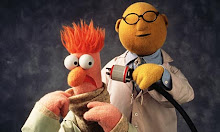Next summer an asteroid will come rocketing through the atmosphere heading straight for Australia! Ok not exactly, actually, it will be samples of an asteroid know as Itokawa inside a capsule that will be released from Japanese spacecraft Hayabusa, as it burns up in the atmosphere.
Hi, I’m Ashleigh, one of the research interns here at NOVA and I’ve been working on researching this story. Sadly, we can’t make the trip to Australia next June, but here are some of the details:
In the summer of 2003 JAXA (the Japanese space program) sent Hayabusa to the asteroid to sample it, the first mission of its kind. Next June, Hayabusa (which means falcon in Japanese) will return to earth, falling, just like an asteroid. NASA and JAXA will be tracking the spacecraft using asteroid tracking software, though they anticipate that it will land in Australia.
Once the capsule containing (hopefully) the asteroid samples has been collected, the samples will be analyzed in a lab in japan. The teams involved are the Hayabusa mission team from Japan, and the Jet Propulsion Laboratory of NASA. The story of the returning spacecraft was first reported by National Geographic Daily News.
Monday, June 29, 2009
Tuesday, June 23, 2009
Buzz Aldrin's Rocket Experience
Why do we love physics raps? Maybe it's the same sweet cringe that makes us devour sour lime popsicles and 8 am reruns of Saved By The Bell. Who knows?
In any case, Buzz Aldrin (yes, the astronaut), Snoop Dogg, Talib Kweli, and friends have teamed up to create the king of all physics raps. It's called Rocket Experience, and that's about all I have to say about it, except that you should really check out the "making of" video for some additional surreality.
As Buzz Aldrin says, "I have only two passions: Space exploration, and hip-hop."
In any case, Buzz Aldrin (yes, the astronaut), Snoop Dogg, Talib Kweli, and friends have teamed up to create the king of all physics raps. It's called Rocket Experience, and that's about all I have to say about it, except that you should really check out the "making of" video for some additional surreality.
As Buzz Aldrin says, "I have only two passions: Space exploration, and hip-hop."
Monday, June 22, 2009
'Honor' to have phallus-shaped mushroom named after scientist

Image credit: Brian Perry
Not many people get to have something in nature named after them. And Dr. Robert Drewes, Curator of Herpetology for the California Academy of Sciences recognizes his good fortune. He thinks it's a 'wonderful honor' to lend his name to a new species of stinkhorn mushroom, discovered on the African island of Sao Tome. Perhaps Dr. Drewes has yet to see the new fungus, now dubbed Phallus drewesii, which is two inches long, shaped like a phallus and gives off a foul, rotting meat odor. Or perhaps he is blinded by the celebrity that often comes with having something named after you.
Our president can commiserate - not long ago, he had a new species of lichen named after him - Caloplaca obamae. Once again, he didn't have much choice in the matter since it's the finder's choice in naming the discovery. But like Dr. Drewes, I'm sure the president smiles fondly whenever he comes across his bright orange lichen. In the same way, Dr. Drewes must be so proud to look upon his namesake phallus-shaped 'shroom.
Friday, June 12, 2009
What We're Watching: Chickens, Ferrets and Cane Toads, Oh My!
Filmmaker Mark Lewis knows how to showcase an animal. This is a producer who can bring a chicken to life like you wouldn't believe. His famous documentary 'The Natural History of the Chicken' is a perfect example. In what other nature film could you watch the story of a woman who brings back to life a once frozen solid chicken using 'mouth-to-beak' resuscitation? Or who else could make an ordinary ferret extraordinary through the eyes of eccentric ferret-lover pet owners who write songs about their beloved animals and even dress them up as cowboys, hula dancers and ballerinas?
One of my favorite scenes of a documentary comes from another of Lewis' hilarious film on the Australia animal scourge: 'Cane Toads: An Unnatural History.' The scene starts with a long shot of a truck swerving back and forth along a road. The driver is speaking while he's swerving and he's talking about how he takes aim at and kills as many cane toads on the road that he can - he does it to protect the natural wildlife, which, unlike the artificially introduced toads, he truly does love. As the truck gets closer, you start to hear thumping, which you can only assume are the toads getting run over.
These amazing films are no typical nature shows - Lewis' verite style that lacks narration draws you in to a subject you never thought could interest you and keeps you coming back for more.
Check out the PBS blog Q&A with filmmaker Mark Lewis to learn more.
One of my favorite scenes of a documentary comes from another of Lewis' hilarious film on the Australia animal scourge: 'Cane Toads: An Unnatural History.' The scene starts with a long shot of a truck swerving back and forth along a road. The driver is speaking while he's swerving and he's talking about how he takes aim at and kills as many cane toads on the road that he can - he does it to protect the natural wildlife, which, unlike the artificially introduced toads, he truly does love. As the truck gets closer, you start to hear thumping, which you can only assume are the toads getting run over.
These amazing films are no typical nature shows - Lewis' verite style that lacks narration draws you in to a subject you never thought could interest you and keeps you coming back for more.
Check out the PBS blog Q&A with filmmaker Mark Lewis to learn more.
Subscribe to:
Posts (Atom)
